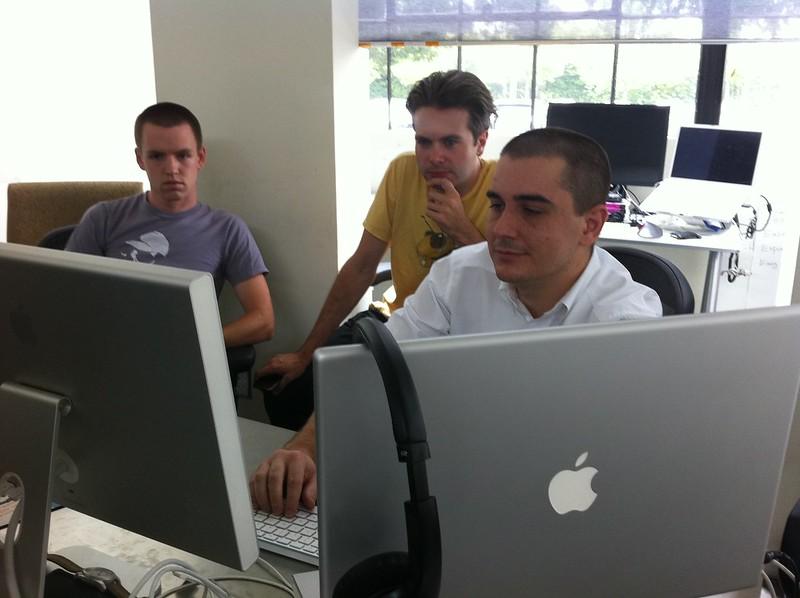Rust is a programming language that many people are interested in and use as an alternative to other popular options such as C and C++. So, many people want to know how to become a rust developer.
Because Rust is a relatively complex language, you need to study hard and seriously. This guide will show you how to master this language and become a rust developer with the necessary skills.
Overview of Rust Developer
Do you know what the duties and responsibilities of a Rust developer are? If not, check out the overview of this profession!
Who Is A Rust Developer?
A Rust developer (dev) is a software engineer or programmer specializing in using Rust to build various software applications.
Rust is popular in web development and system programming in many fields due to its:
- Safety
- Concurrency
- Stability
- High performance
Rust developers harness the power of Rust to create efficient software solutions. So, they are valuable assets to firms seeking to build reliable software.

What Do Rust Developers Do?
Like other programmers, rust developers’ main job is to write, test, and take care of the code for different types of software. Here are their tasks:
- Research end-user needs and build technical specifications.
- Create software using Rust, for example, computer programs or websites.
- Ensure that software doesn’t use too much computer memory and avoid common errors, like memory leaks and null pointer errors.
- Integrate third-party components.
- Optimize software to run in games and big systems.
- Use Rust’s safety features to build software hackers cannot break into.
- Test and fix bugs.
- Verify and deploy software.
- Team up with others.
- Create documentation.
- Keep learning about Rust and new tech.
Work Environment
Rust developers usually work in offices or tech companies that make software. Many also work from home because their tasks are mostly on computers.
They often work with different teams, including designers, project managers, and database administrators, but they also spend a lot of time working alone.
So, Rust developers have some flexibility in where they work. Yet, they spend a lot of time on computers, writing and fixing code, and they always need to keep learning to stay good at their job.

Types of Rust Devs
There are various types of Rust developers, each focusing on different aspects of software:
- Systems dev: These devs work on the deep technical stuff, like creating OSs, game engines, and file systems. They use Rust to make it super reliable and fast.
- Web dev: These devs build high-performance websites and online services.
- Network dev: These devs use Rust to create networking tools and make them fast and safe, for example, protocols, firewalls, or routers.
- Full-stack dev: These devs handle both the backend and the frontend.
- Embedded dev: These devs work on tiny computers inside non-PC devices like microwaves or cars.
- Game dev: These devs create video games, including game engines, game programming, and graphics rendering.
How To Become A Rust Developer
To become a Rust developer, you should start with a Bachelor’s degree and Rust language. After that, you should learn more in-depth knowledge about blockchain development.
You should also begin gaining experience in your Bachelor’s degree program by working on Rust-related projects. I will provide a detailed step-by-step guide for you to do these things and apply for this job!
1. Get A Bachelor’s Degree
While there’s no specific degree dedicated solely to Rust development, I recommend pursuing a Bachelor’s degree in:
- Computer Science
- Software Engineering
- Software Development
- Information Technology
These degrees teach you how to make computer programs, which is what Rust is about. If you have a passion for embedded systems, you can choose an electronics or embedded engineering major.
While you’re in college, ensure you get the hang of basic computer knowledge, including data and how programs work. Your coursework will cover these topics extensively.
In this stage, don’t just focus on theory. Instead, I recommend getting involved in Rust projects online to learn and work with other Rust programmers.
College is not just about getting good grades; it’s about learning and expanding your horizons. Stay curious and explore new subjects and ideas!
2. Learn Rust and Related Languages

While you’re in college, you should also spend time learning Rust. Since mastering Rust is a prerequisite to becoming a Rust developer, the sooner you learn the language, the more advantages it will give you.
To learn Rust, I recommend visiting Rust’s official website and using their Rust book to grasp the basics. You need to understand the language rules and how it handles data. Remember to practice writing code to get comfortable with it.
If you’re new to programming, you can start with C or C++ because they share similarities with Rust but are easier. In this case, beginner-friendly books like “C Programming Absolute Beginner’s Guide” can help you know the basics.
In this step, you also need to know how to use Cargo. It is Rust’s tool for managing projects, handling libraries, and building your projects.
Besides, you should know another language, like Python, because this makes you more valuable to employers. Python is versatile. So, learning is beneficial, especially for data science, machine learning, or automation.
If web development interests you, I recommend picking up JavaScript, HTML, and CSS. These are popular in full-stack web development, which pairs well with Rust.
If you find self-studying hard, you can look for online courses or tutorials dedicated to this field. Platforms like Udemy, Coursera, and edX offer comprehensive Rust courses.

3. Be Familiar With Blockchain Development
After learning the basics of Rust and getting comfortable with its rules and how to write code, you need to know blockchain basics, including its decentralized nature, consensus algorithms, and cryptographic principles.
Then, dive into Rust frameworks like Rocket, Substrate, and Parity, which help you build blockchain applications. Regarding cryptography, you need to study digital signatures and how data is secured.
After that, you can practice by writing basic smart contracts using Rust. These are like self-executing agreements in blockchain systems.
One more thing you need to learn is decentralized apps (DApps). You must know how to use Rust for the technical part to build them on platforms like Ethereum or Polkadot.
To be more favorable when learning these, you should be part of online blockchain developer groups, such as GitHub and Stack Overflow.
After knowing the basics, I recommend creating your blockchain projects. Start small and gradually tackle more complex tasks.
4. Get A Master’s Degree (Optional)
Many Rust developers pursue a Master’s for in-depth knowledge in the field. This degree proves they have professional knowledge of Rust development. So, employers will prioritize them when recruiting for this position.
Yet, it’s a big commitment in terms of time and money, and many Rust developers I know succeed without a Master’s. So, think carefully about your goals before taking this path.
If you decide to go for it, choose a program that matches your interests, like CS or Software Engineering. Ensure the program teaches Rust or allows you to use it in your projects. Rust should be part of your learning.
In this step, I recommend specializing in a particular area like blockchain or distributed systems and focusing on Rust-related fields.
5. Gain Experiences

Employers do not appreciate candidates with only theoretical knowledge. So, gain experience as soon as possible!
To get experience, you can begin with small personal projects, like building simple things like command-line tools or web apps using Rust.
You can also practice your skills on websites like LeetCode or HackerRank. Solving coding problems in Rust sharpens your abilities.
After graduating, consider freelancing, internships, part-time jobs, or entry-level positions in Rust development. These give you practical experience and could lead to a full-time job.
When you have some experience, you need to create a portfolio showing your projects, contributions, and Rust-related achievements.
By following these steps and practicing regularly, you can gain experience and become a skilled Rust developer.
6. Networking and Apply For Jobs

After you have prepared well in knowledge and skills, the next step is to build a network and apply for jobs.
First, you can start by making a professional LinkedIn profile and a personal website to show off your Rust skills and projects.
You should be part of Rust groups online, like forums and social media. There, you can create relationships with other Rust experts and potential employers.
Besides, look for local or online Rust meetups and conferences. These events help you meet other developers and maybe find job leads. Don’t be shy; say hi and make friends.
Then, when you feel confident, you can find jobs on job boards or from your network. Look for one that is suitable for your skills and needs.
With each position, you need to change your resume and CV to highlight your Rust skills. Remember to mention the projects you’ve done. Keep at it, apply for some jobs, and don’t be discouraged by rejections!
After applying for jobs, prepare for interviews by practicing coding and answering questions about your skills. In the interviews, don’t be afraid to talk about your pay and benefits.
After being accepted into this position, try your best to complete the assigned tasks to become a successful Rust developer!
Skills of Rust Development Jobs
A powerful skill set makes you a valuable asset in Rust development. Here are the top skills you need to build:
- OOP: Because Rust is an OOP language, you need to know how to organize and design code using OOP principles.
- Frameworks and tools: Being skilled with Rust tools like Cargo and frameworks like Rocket or Actix is vital for building Rust applications.
- Secure coding: Knowing how to write code that’s safe from security issues, like preventing memory problems, is crucial.
- Engineering principles: You need to follow good coding practices, use design patterns, write clean code, and manage versions with Git.
These skills collectively help you create secure, efficient, and maintainable software.
Reasons To Learn Rust
You should learn Rust because it can boost your skills and career prospects. And it is more and more popular due to these benefits:
- Safety: Rust is known for keeping your programs safe. It stops common errors that can crash programs or make them insecure.
- Speedy performance: Rust is as fast as languages like C and C++. So, it’s for tasks that need quick and efficient processing.
- Handling many tasks: Rust can work with multiple tasks smoothly at once.
With these benefits, learning Rust opens up job options. You can work in web development, system programming, games, etc. Besides, Rust’s community is lively and growing. As a result, there are more learning resources and support.
Salary
According to ComputerCareers, the salary range for Rust developers in 2023 falls between $79,000 and $124,000 per year.
- Base pay: The core salary typically ranges from $74,000 to $116,000 per year.
- Additional pay: On top of the base salary, they might get extra money, usually between $5,000 and $8,000 annually. This extra pay could come from bonuses or profit-sharing.
These salaries can change a lot based on how much experience someone has, where they work (like big cities vs. smaller towns), the size and reputation of the company, and the specific job they do.
Career Path
As a Rust developer, you can specialize in game or web development or embedded systems. Then, your career path can be broken down into stages:
1. Entry level: Begin your career as a Junior Rust Developer or Intern. Work on smaller projects and learn from experienced developers.
2. Middle level: As you gain experience, become a Software Engineer or Systems Programmer. Work on more complex projects and maybe contribute to open-source projects.
3. Senior level: With more experience, become a Senior Software Engineer, Team Lead, or Technical Architect. You’ll lead teams and handle challenging projects.
4. Technical leadership: Some Rust developers become Chief Architects or CTOs, leading technical teams.
Besides working on-site, experienced Rust developers can work as consultants or freelancers on various projects. Some contribute to teaching and training.

FAQs
Are Rust Developers In Demand?
Yes, there’s a high demand for Rust developers. Rust is helpful in many areas, including web and game development. So, Rust developers are sought after by companies.
What Programming Language Does Rust Use?
Rust is its own language. It doesn’t use another language. But sometimes, it can work with other languages like C and C++.
Is Rust Similar To C++?
Rust is syntactically similar to C++. But regarding performance, it is more flexible and convenient and creates safer software.
Is Rust Better Than Python?
The answer is yes. Rust is better than Python regarding performance, control level, and memory safety. It is more efficient, stable, and safer.
Conclusion
The demand for Rust developers increases as more companies use Rust in their software. So, consider pursuing this career if you love programming.
I hope the above sharing on how to become a Rust dev has helped you know how to have the foundation, skills, and experience for this position!
